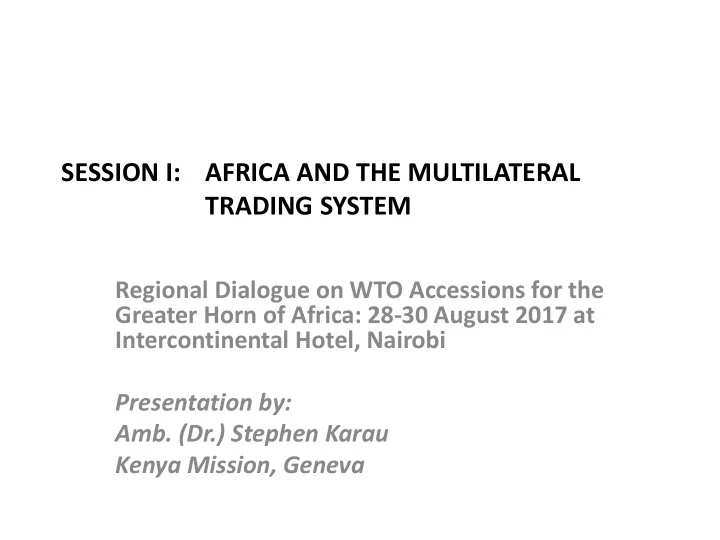

SESSION I: AFRICA AND THE MULTILATERAL TRADING SYSTEM Regional Dialogue on WTO Accessions for the Greater Horn of Africa: 28-30 August 2017 at Intercontinental Hotel, Nairobi Presentation by: Amb. (Dr.) Stephen Karau Kenya Mission, Geneva
OUTLINE OF THE PRESENTATION I. INTRODUCTION: CURRENT TRENDS IN AFRICA II. AFRICA AND THE WTO MULTILATERAL TRADING SYSTEM III. AFRICA’S INTEREST IN THE WTO POST NAIROBI AGENDA 2
I. INTRODUCTION: CURRENT TRENDS IN AFRICA • Africa is the second most populous continent with a population of 1.216 billion in 2016. • Population is projected to reach 2.3 billion by the middle of the century • By the end of this century, there will be 4 billion Africans • Population trends reflect real market potential that is growing • Today about 48 per cent of Africans are below 18 years of age. The youth bring dynamism to the African economies 3
INTRODUCTION: CURRENT TRENDS IN AFRICA (CON’T) • African continent has shown economic resilience in current global economic environment • The continent has continued to experience one of the fastest growing regions in the world • 7 countries – Cote d’Ivoire, Ethiopia, Kenya, Mali, Rwanda, Senegal and Tanzania - continued to register high growth rates of above 5.4 per cent in 2015 – 2017 • Africa’s growth is expected to raise from a rate 2.6 per cent in 2017 to 3.2 per cent in 2018 and 3.5 per cent in 2019. 4
II. AFRICA AND THE WTO MULTILATERAL TRADING SYSTEM • Trade has become a significant issue on the agenda of almost all African countries, because its potential for economic growth and development • Although Africa’s share of world trade has continued to stagnate overtime at below 3%, African countries have continued to liberalize their trade regimes • All African countries and their regional economic blocs are participating, simultaneously, in a series of multilateral, regional and bilateral negotiations 5
AFRICA AND THE WTO MULTILATERAL TRADING SYSTEM (CON’T) • On the continent, the trade agenda is notable for its series of initiatives all aimed at strengthening economic development and integration by promoting trade. • The EAC/COMESA/SADC Tripartite free trade involving 26 countries is under implementation • The implementation of Common External Tariff in West Africa is in progress • The negotiations on Continental Free Trade Area (CFTA) are underway and expected to be concluded by end of this year 6
AFRICA AND THE WTO MULTILATERAL TRADING SYSTEM (CON’T) • At the World Trade Organization (WTO) African Countries have been very actively participating in the Multilateral Trading System including in the multilateral trade negotiations. • Of the 164 Members of the WTO, 43 are African countries, representing nearly a quarter of the organization’s membership. • Despite their limited resources African countries are actively involved in the work of the WTO including negotiations 7
AFRICA AND THE WTO MULTILATERAL TRADING SYSTEM (CON’T) • In Geneva, African WTO Members have taken steps to mitigate their limited resources and improve the level of participation in the activities of the WTO. • An informal WTO African Group was established in 1995 . • The mandate of the African Group is established by African Ministers responsible for WTO matters. • The WTO African Group meets at two levels: ambassadors and experts • The Group is coordinated on a rotational basis by one of its members. 8
AFRICA AND THE WTO MULTILATERAL TRADING SYSTEM (CON’T) • Besides participation in the negotiations and regular work of the WTO, 5 members of the African Group are currently chairing key WTO bodies at ambassador-level. General Council – South Africa Committee on Trade and Development – Zimbabwe Committee on Regional Trade Agreements – Tunisia Committee on Agriculture, Special Session – Kenya Sub-Committee on Cotton – Kenya Dispute Settlement, Special Session – Senegal 9
AFRICA AND THE WTO MULTILATERAL TRADING SYSTEM (CON’T) • Overall, the engagement of the African countries at WTO multilateral trading system is aimed at ensuring the following: Equitable distribution of the benefits the MTS Effective integration of African countries into the MTS Adequate policy space for African countries Stressing the important of Aid for Trade in addressing capacity and supply side constraints Emphasizing the importance of the WTO multilateral trading system in supporting regional integration 10
AFRICA’S INTERESTS IN WTO POST NAIROBI AGENDA • The Nairobi Ministerial Declaration does not contain a work program on the outstanding Doha Development Agenda (DDA) issues. • In a sense this reflects a lack of consensus among the members on some issues. • Notwithstanding divergent views, under paragraph 31 of the Nairobi Ministerial Declaration, all Members agreed to continue negotiations on the remaining Doha issues with some calling for inclusion of new issues in the post Nairobi Agenda. 11
AFRICA’S INTERESTS IN WTO POST NAIROBI AGENDA (CON’T) • In Geneva, the MC11 preparatory process has begun and there has been intensive discussions and negotiations in a number of areas. • Some of the priority DDA outstanding issues for the African Group include: Domestic support in agriculture including cotton ; Public stockholding for food security; Special Safeguard Mechanism in agriculture Fisheries subsidies Special and differential treatment 12
AFRICA’S INTERESTS IN WTO POST NAIROBI AGENDA (CON’T) • Some Members have also submitted proposals for Ministerial decisions at MC11 on other issues: E-commerce, Investment Facilitation and; Micro, Small and Medium Enterprises (MSMEs). • The African Group is actively engaged in discussions on these issues with a view understanding their scope and implications 13
Thank you 14
Recommend
More recommend